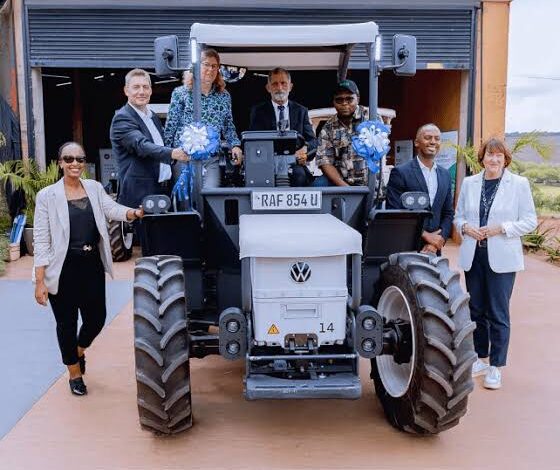
Faith Nyasuguta
German automaker Volkswagen is set to establish an e-tractor manufacturing plant in Nigeria, marking a major step toward advancing agricultural mechanization in the country. This initiative is expected to boost productivity in Nigeria’s farming sector while strengthening economic ties between Nigeria and Germany.
The announcement was made by Nigeria’s Minister of Foreign Affairs, Hon. Yusuf Maitama Tuggar, following a meeting with Germany’s Minister of State, Mrs. Katja Keul, during the G20 Foreign Ministers’ Meeting. Tuggar highlighted that the project, supported by the German government, aims to modernize Nigeria’s agricultural sector and promote sustainable farming practices.
“Volkswagen’s plan to introduce e-tractors to Nigeria aligns with our efforts to enhance agricultural mechanization and improve food security,” Tuggar stated.

The e-tractors are designed to make farming more efficient and environmentally friendly, providing Nigerian farmers with advanced tools to boost productivity. This move is expected to create jobs, stimulate rural economies, and reduce the country’s reliance on outdated farming methods.
Challenges in Nigeria Auto Industry
Nigeria’s automotive industry has faced challenges in attracting major global manufacturers, partly due to the delayed implementation of the Nigeria Auto Industry Development Plan. Although the plan has been approved by the Federal Executive Council, it has yet to be signed into law, limiting the sector’s growth potential.
In fact, Nigeria previously missed out on hosting Volkswagen’s new Body Shop and Assembly Plant when the automaker chose Egypt instead. Egypt’s proactive Automotive Industry Development Programme (AIDP), aimed at boosting local production and attracting investments, played a key role in securing the deal.
However, Volkswagen’s renewed interest in Nigeria signals growing confidence in the country’s economic prospects and presents an opportunity to strengthen its automotive sector.
Volkswagen’s Footprint In Africa

Volkswagen has been expanding its presence across Africa through its dedicated “Sub-Saharan” region, which oversees operations in several countries. The company currently has manufacturing and assembly plants in South Africa, Kenya, Rwanda, and Ghana.
In Rwanda, Volkswagen launched the GenFarm Project, providing e-powered mechanized farming services to rural communities. The project features e-tractors with swappable batteries, promoting cost-effective and sustainable farming.
With Nigeria set to host its next e-tractor plant, Volkswagen is poised to play a key role in modernizing African agriculture, helping farmers increase productivity while supporting green energy solutions.
RELATED:








